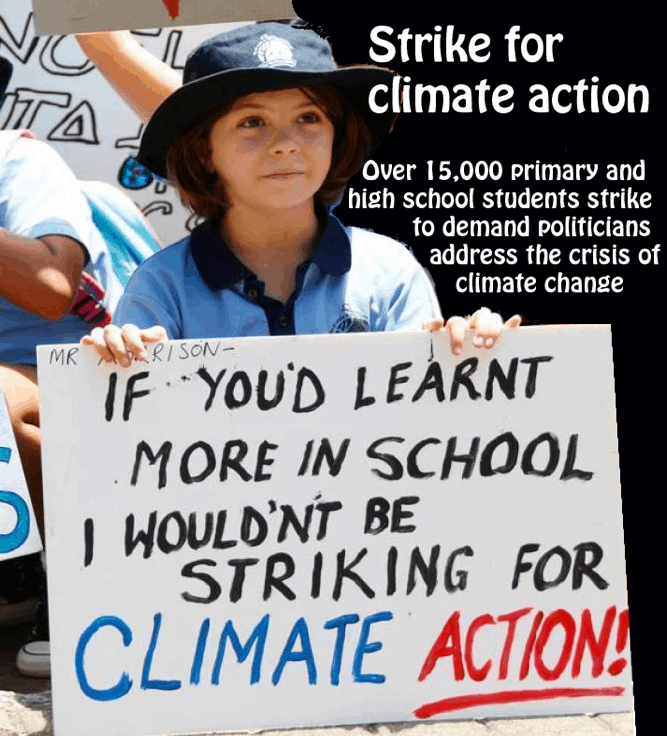- David Rothfield is President of the Bayside Climate Change Action Group (BCCAG) and an AJDS committee member.
It’s nearly thirty years since climate change first came on to our political agenda. In 1990, the Coalition under Andrew Peacock pledged to cut greenhouse gas emissions by 20% within 10 years if they won office.
Officially, Australia’s emissions have dropped since then by just 8.6%, but the figure is illusory. It includes the emissions reduction from land clearing from an outrageously high peak in 1990. The inclusion of Land Use in total emissions was a special provision granted to Australia and a small group of countries by the United Nations Framework Convention on Climate Change (UNFCC) in 1997 at Australia’s request, to satisfy its claim that it would suffer relatively large economic losses in reducing its emissions and therefore, its mitigation commitment should be less onerous than other parties1.
Furthermore, the 8.6% drop ignores and excludes the mushrooming quantity of unmeasured emissions from gas exploitation in northern Australia. If land use change is excluded, we see that Australia’s emissions have risen steadily throughout the period, except briefly whilst the carbon price was in effect. Emissions from gas exploitation are becoming the primary cause of our emissions increase, overtaking the increase from transport.
There is no effective federal government policy in place to actively reduce emissions. Where in 1990 there appeared to be cross-party consensus on emissions reduction, the coalition government today has attempted to roll back policy gains by previous governments.
Why has consensus been lost?
Over the past 20 years, free markets have gone global through a series of secretive agreements between global corporations and countries, facilitated by the World Trade Organisation (WTO). As a result of such agreements, manufacturing has moved to the places with the lowest protection of workers’ rights and the lowest environmental protection standards. All in the name of cutting costs and maximising profits for shareholders.
Cheap goods have flooded the market and the rate at which these are bought and then disposed of has escalated. The reliance of both the production and the disposal process on fossil fuels means emissions have escalated too.
As Naomi Klein explains in her book This Changes Everything, nations or sub-national jurisdictions that embark on ambitious programs to cut their emissions are often found to be in breach of trade regulations. This happens when some form of conditional protection is given to local producers or providers. The free pass to international trade also means that embedded emissions increase every time a product or a component of a product is shipped from one place to another. For instance, Cod caught off the coast of Norway is shipped to China to be turned into filets, then shipped back to Norway for sale.
Of all corporate power, the greatest influence on government is exerted by the fossil fuel sector. This sector more than any other is threatened by climate action and is not shy about using its muscle to influence politics. As Klein says. “The handy thing about selling natural resources on which entire economies have been built, is that most people keep having to buy your products whether they like you or not”.
Collateral damage from the free market
If a free market economy places no value on environmental assets, those assets will, over time, be consumed or degraded. If clean waterways have no value, then the waterways become polluted. Clean air with no value becomes polluted, forests with no dollar value, other than as a raw material are plundered or burnt and converted to pasture. Wild places of natural beauty but with no intrinsic value, are replaced by prime real estate. Instead of being a carbon sink, the environment itself becomes a carbon source.
Today, science tells us that things are much worse than we understood 30 years ago. Climate change is happening faster than most models predicted2. Furthermore, humanity is facing a global existential threat, not only from accelerating climate change but a range of interconnected threats. These include land degradation, deforestation, marine degradation and species extinction3. We have fouled and degraded the oceans and the land on which we and the whole web of life that surrounds us depends.
Risk of Collapse
Cultures, nations and empires have dramatically collapsed before. The classic examples from antiquity are Easter Island and the ancient Sumerian Empire. In both cases, collapse came about after their environmental assets (trees on Easter Island and top soil in the case of Sumer) were exhausted. Unsustainable economic and population growth led to environmental and societal collapse. Similar trajectories occurred with Ancient Greece and Imperial Rome. These empires managed to thrive even after their domestic environmental assets had been depleted by conquering new territories and acquiring new environmental assets once their domestic assets had been depleted.
The modern global economy appears to have reached a critical juncture. It has managed to grow, until today, by continuously opening up new territories for exploitation and developing chemical substitutes for lost soil fertility. Climate change and biodiversity loss are likely to halt our capacity to continue this way. The risk of collapse in this age is not local. Human civilisation faces the threat of extinction together with a long list of species already extinct, or soon facing extinction.
The Good News
Surveys suggest that a growing proportion of Australia’s population want action on climate change. For the first time since 2007, it promises to be a focal issue in the forthcoming federal election. That we face a climate emergency is rapidly being recognised and referred to by prominent figures. A growing number of municipalities have embarked on climate emergency planning, including the City of London. School kids are striking to demand the government act to save their future. We have the solutions. All that is missing is the political will to act before it is too late.
- https://law.anu.edu.au/sites/all/files/coast/lulucfoffsets_17_feb_2011.pdf
- https://www.nationalgeographic.com/environment/2018/10/ipcc-report-climate-change-impacts-forests-emissions/
This article appeared in the AJDS Magazine Just Voices, issue 17, 2019: Environmentalism.

